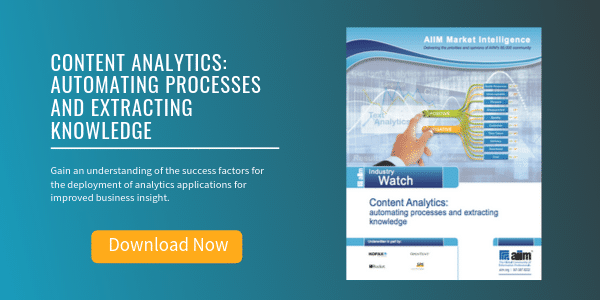
Content Analytics: How Do These New Tools Stack Up Against Search Engines?
Enterprise Content Management (ECM) | Analytics | Enterprise Search
The term "Content Analytics" has been coined to cover a range of advanced search and content reporting technologies. In our new Industry Watch survey, we found that organizations could derive much higher business value from content analytics tools than from simple search-engines.
Sophisticated content reporting across text documents and rich media file-types have created the opportunity to report and research across unstructured content, bringing the same capabilities of strategic insight and improved decision-making as Business Intelligence (BI) reporting brings to structured content.
Relatively new as a recognized toolset, content analytics tools provide trend analysis, content assessment, pattern recognition, and exception detection. In this report, we have explored the user-perceived limitations of conventional search and the potential savings that could be achieved by the application of content analytics to a number of business scenarios such as fraud detection, asset protection, healthcare research, and market monitoring.
Here are some of our key findings:
-
For 72% of respondents, it is harder to find information owned by their organization than information not owned by them – i.e., on the Web.
-
Of the 47% who find they frequently need to use Advanced Search options, more than half would like something more effective.
-
70% would find advanced analytic functions “extremely useful” or “very useful.”
-
For most content types, our respondent’s ability to “research” is 3-6 times less than their ability to “search,” particularly for rich media files, but also office documents and emails.
-
E-discovery, Digital Asset Management (DAM), Web Analytics and De-duplication are the better-known technologies compared to Sentiment Analysis, Copyright Detection, and Digital Forensics.
-
There are strong plans to adopt DAM, Faceted Search, E-discovery, and Content Assessment in the next 18 months.
-
The biggest obstacle faced regarding content decommissioning is “not clear which content is valuable and which is not.” There is also considerable “Fear of the compliance and regulatory impact of deleting information.”
-
Only 15% have an automatic way of finding and deleting duplicates in their content stores, with just 8% able to analyze them automatically for relevancy and to delete irrelevant content.
-
50% would find it of “high” or “very high” commercial value to be able to link a customer/citizen/ staff-member search across structured (database) data & unstructured documents & case notes. 44% would find it of “high” or “very high” commercial value to be able to automatically redact (blank out) sensitive information across forms, etc.
-
81% of those who have digital assets to manage are not using a dedicated Digital Asset Management system, but 14% of our respondents are planning to implement one in the next 18 months. 48% store digital assets and rich media on ad hoc file shares.
-
59% would find it of “high” or “very high” commercial value if they could use a faceted search across multiple metadata tags to cross-reference categories of rich media. 50% would find it of “high” or “very high” commercial value if they could detect unauthorized use of their assets across the web.
-
Net spending on Enterprise Search, Digital Asset Management and Content Analytics is set for a considerable increase in the next 12 months.
About John Mancini
John Mancini is the President of Content Results, LLC and the Past President of AIIM. He is a well-known author, speaker, and advisor on information management, digital transformation and intelligent automation. John is a frequent keynote speaker and author of more than 30 eBooks on a variety of topics. He can be found on Twitter, LinkedIn and Facebook as jmancini77. Recent keynote topics include: The Stairway to Digital Transformation Navigating Disruptive Waters — 4 Things You Need to Know to Build Your Digital Transformation Strategy Getting Ahead of the Digital Transformation Curve Viewing Information Management Through a New Lens Digital Disruption: 6 Strategies to Avoid Being “Blockbustered” Specialties: Keynote speaker and writer on AI, RPA, intelligent Information Management, Intelligent Automation and Digital Transformation. Consensus-building with Boards to create strategic focus, action, and accountability. Extensive public speaking and public relations work Conversant and experienced in major technology issues and trends. Expert on inbound and content marketing, particularly in an association environment and on the Hubspot platform. John is a Phi Beta Kappa graduate of the College of William and Mary, and holds an M.A. in Public Policy from the Woodrow Wilson School at Princeton University.



